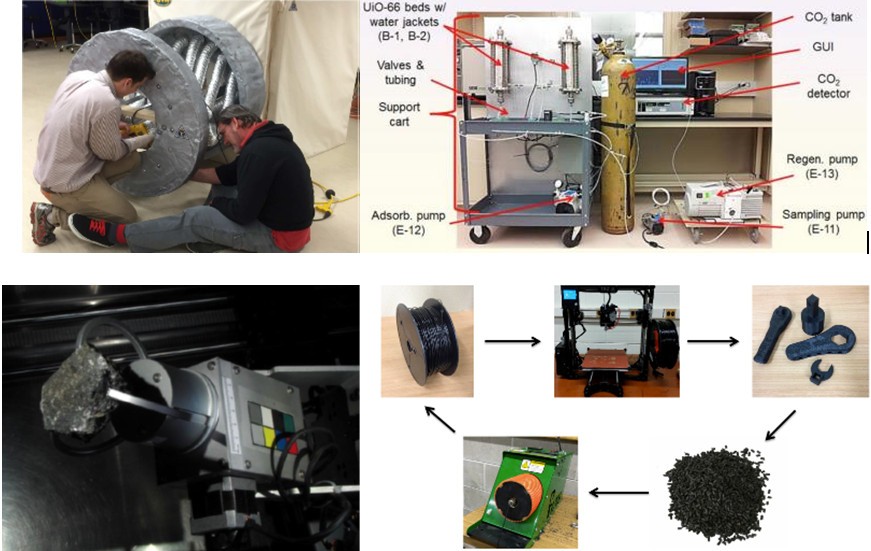Moon to Mars eXploration Systems and Habitation (M2M X-Hab) 2026 Academic Innovation Challenge
The Moon to Mars eXploration Systems and Habitation (M2M X-Hab) 2026 Academic Innovation Challenge is a university-level challenge designed to develop strategic partnerships and collaborations with universities. It has been organized to help bridge strategic knowledge gaps and increase knowledge in capabilities and technology risk reduction related to NASA’s vision and missions. The competition is intended to link with senior- and graduate-level design curricula that emphasize hands-on design, research, development, and manufacturing of functional prototypical subsystems that enable functionality for space habitats and deep space exploration missions. NASA will directly benefit from the challenge by sponsoring the development of innovative concepts and technologies from universities, which will result in novel ideas and solutions that could be applied to exploration.
Innovation is the keystone to this challenge. Universities and investigators not normally associated with the aerospace industry are encouraged to consider their potential contribution to changing the way the space industry views the solution space.
NASA’s Mars Campaign Office (MCO) anticipates offering multiple awards up to $15k - $50k each to design and produce studies or functional products of interest to NASA (see Section 3.2, M2M X-Hab Proposal Topic List) as proposed by university teams according to their interests and expertise. The prototypes produced by the university teams (examples of which are shown in Figure 1) may be integrated into existing NASA-built operational prototypes. Universities interested in participating will submit M2M X-Hab proposals, which will be reviewed by technical experts; subsequent down-selection will determine which projects will be funded. M2M X-Hab university teams will be required to complete their products for evaluation by NASA MCO mentors in May 2026. Universities may form collaborations to perform as a single distributed project team.

Students in the Critical Path
The M2M X-Hab Academic Innovation Challenge has a unique approach to student involvement, in that the student team is placed in the NASA mission critical path for the product or technology that they develop alongside NASA researchers. Teams are required to go through a series of NASA-standard assessments as other NASA engineering products, including a System Definition Review (SDR), a Preliminary Design Review (PDR), and a Critical Design Review (CDR). With this approach, NASA is putting a great deal of responsibility on the students. This in turn gives the students a bigger stake in the development of space technologies that likely will form the basis for future systems and technologies that will be flown in space.
Eligibility
Proposals will be accepted from faculty who are U.S. citizens and currently teach an Accreditation Board for Engineering and Technology (ABET)-accredited engineering senior or graduate design, industrial design, or architecture curriculum teaming course at a university affiliated with the National Space Grant College and Fellowship Program, or other US accredited university. Multidisciplinary, multi-departmental, and/or multi-institutional teaming collaborations are highly encouraged.
In order to fully comply with the United States Department of Commerce, Bureau of Industry and Security (BIS) Export Administration Regulations (EAR), participation in the M2M X-Hab Academic Innovation Challenge by citizens of controlled countries, as defined in Part 768.1.d is prohibited. This restriction applies to all faculty members, staff, students, consultants, and any other individual that participates in the M2M X-Hab Academic Innovation Challenge. For the current “Controlled Countries” list, reference EAR Part 768.1d
Proposal Information
Challenge Solicitation: 2026 Solicitation - March 14, 2025
Important Dates: All dates tentative until the announcement has been released
| March 14, 2025 | Release of RFP |
| April 3, 2025 | Questions for online Technical Interchange Due |
| April 11, 2025 | Responses for questions published online XHAB Questions - Updated 04/14/2025 |
| Monday, April 28, 2025 | Proposal Due Date |
| June 2, 2025 | Award Made - Announcement Pending |
Proposal Topic List:
- Autonomous Charging Service Capability for Surface Rovers and Systems
- Lightweight Active Surface Tunnel Elements for Pressurized Transfer
- COOLER – Cryogenic Operations for Off-gassing Losses and Efficient Recovery
- What to do with all this CO2? Regeneration in a Martian Environment
- Medical Eyewash Redesign
- Mechanical Sealing of a Cryogenically Cold Circular Interface in a Vacuum
- R&D for Lightweight Space Suit Portable Life Support System (PLSS)
- Smart Textiles for Space Applications
Resources:

